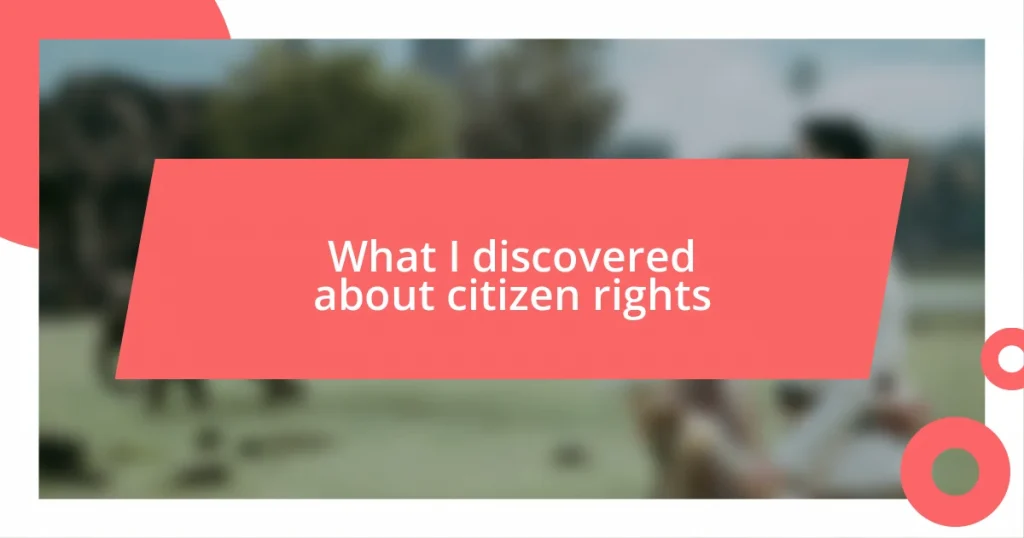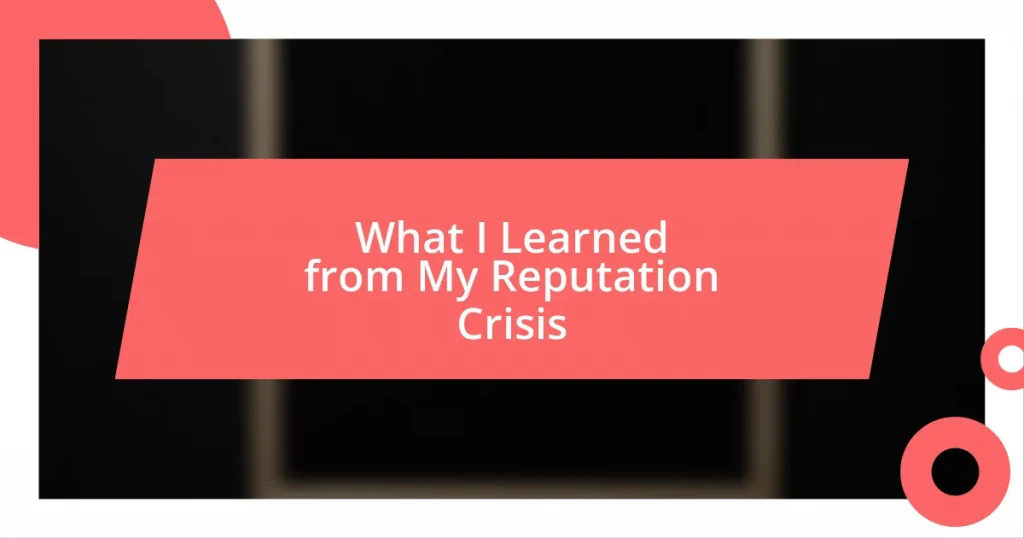Key takeaways:
- The Magna Carta in 1215 marked a significant shift towards individual rights and limitations on absolute power.
- Key movements, including the American Revolution and the civil rights movement, have shaped the ongoing struggle for dignity and equality.
- Foundational laws, such as the Universal Declaration of Human Rights and the Civil Rights Act of 1964, play crucial roles in protecting citizen rights and promoting equality.
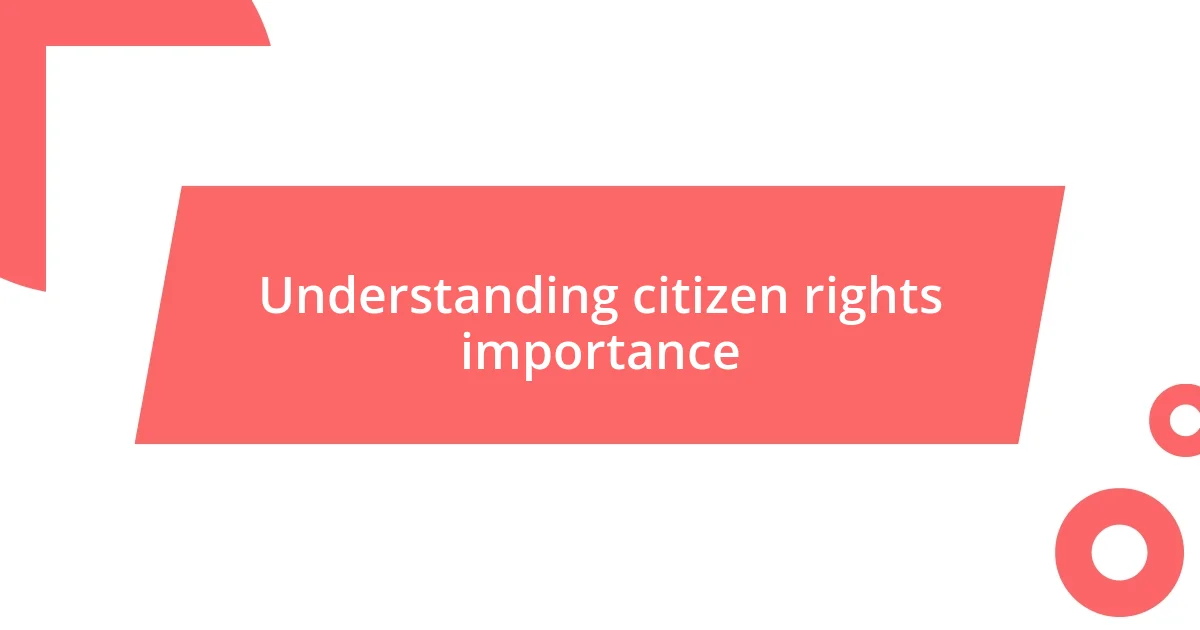
Understanding citizen rights importance
Citizen rights are fundamental to our fabric as a society; they empower individuals and uphold dignity. I remember volunteering at a local organization focused on boosting civic engagement, and hearing people share personal stories about how their rights transformed their lives was truly enlightening. When we grasp the importance of these rights, it becomes clear that they are not mere legalities but pillars of freedom, justice, and equality.
Imagine if we didn’t fully understand our rights; how might that impact our ability to stand up against injustice? I’ve seen instances where individuals who lacked this knowledge felt powerless in the face of discrimination or marginalization. It’s heartbreaking to witness the difference that awareness can make—recognizing one’s rights can ignite courage, inspiring people to demand change and advocate for their communities.
Furthermore, citizen rights facilitate a sense of belonging and responsibility within society. I often reflect on my own journey of learning about civic duties and how it fueled my commitment to participate in local governance. Understanding these rights transforms us from passive observers into active participants, encouraging us to contribute to a thriving democracy—have you ever considered how your knowledge of rights shapes your role within your community?
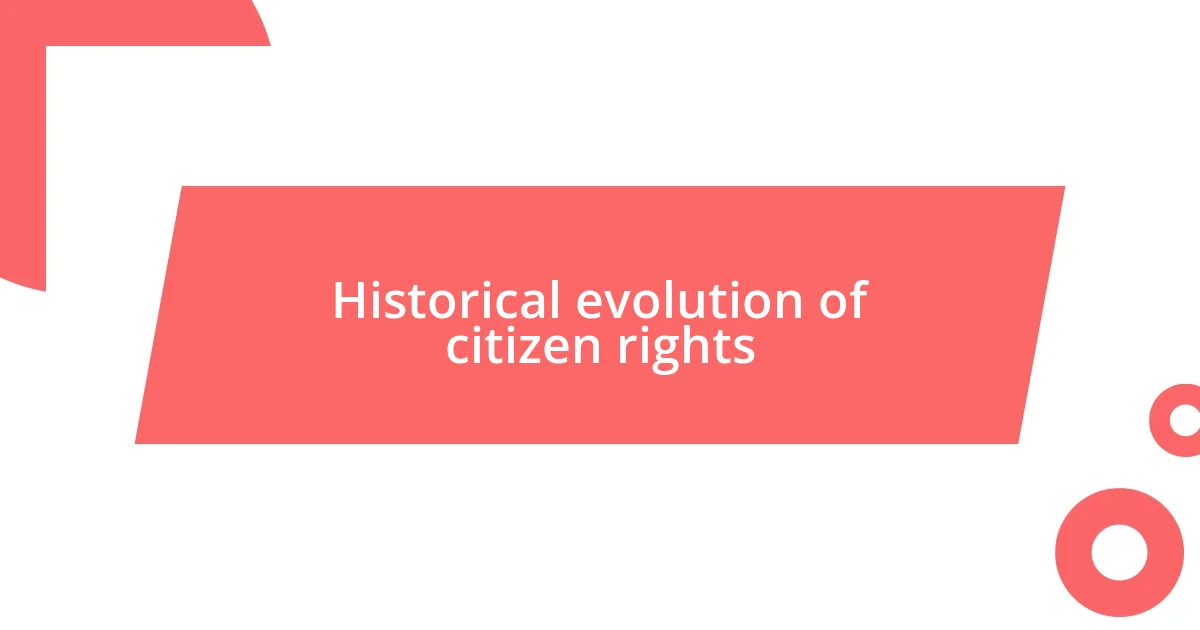
Historical evolution of citizen rights
The historical evolution of citizen rights is a fascinating journey that reflects humanity’s struggle for dignity and equality. I’ve often thought about how each milestone in this journey resonates on a personal level. For example, the Magna Carta in 1215 marked a significant shift, as it began to challenge the idea of absolute power and laid the groundwork for individual rights. Reflecting on this, it’s remarkable how our modern concept of citizen rights owes so much to such early documents that sought to limit authority and empower individuals.
Throughout history, various movements have further shaped the landscape of citizen rights, despite significant challenges. Consider the following key moments:
- The American Revolution (1775-1783) emphasized the ideals of liberty and self-governance.
- The French Revolution (1789) brought about the Declaration of the Rights of Man and of the Citizen, proclaiming fundamental rights for all.
- The civil rights movement in the 1960s highlighted the ongoing struggle against racial discrimination and pushed for equal rights in America.
These examples resonate with me because they remind me of the tireless efforts of individuals who risked everything for the rights we often take for granted today. When witnessing similar acts of courage in our times, I can’t help but feel inspired and motivated to continue advocating for rights that are still being fought for across the globe.
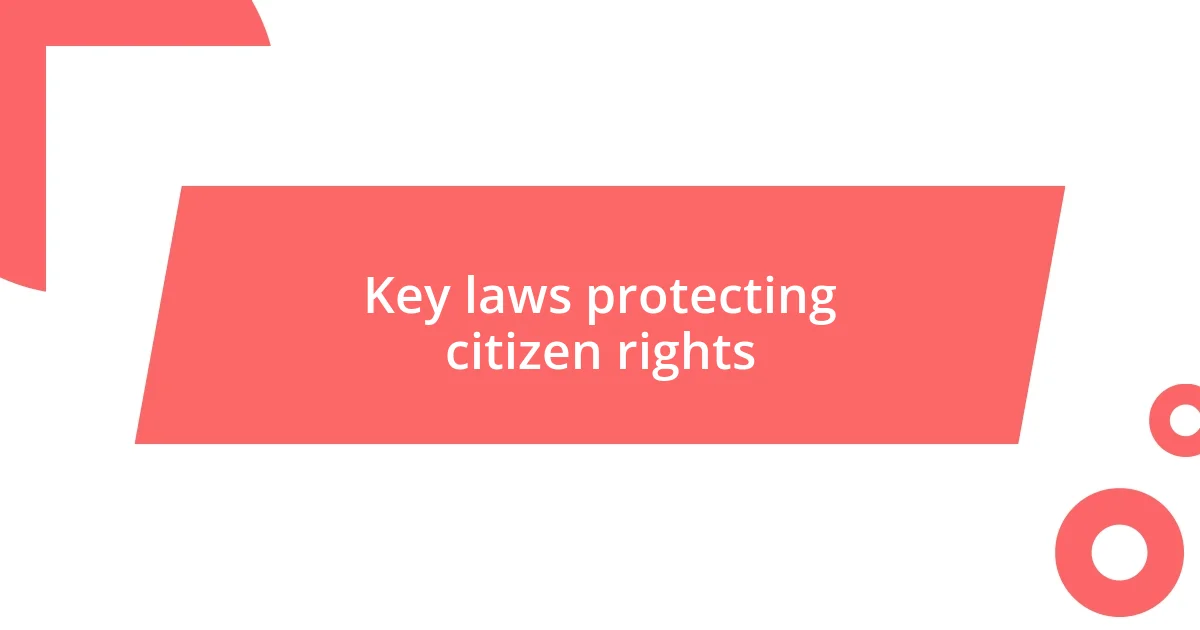
Key laws protecting citizen rights
Key laws that protect citizen rights play a crucial role in safeguarding individual freedoms and ensuring justice. For instance, the Universal Declaration of Human Rights, adopted in 1948, serves as a global benchmark for human rights standards. I recall reading about how these laws emerged from the ashes of World War II, a powerful reminder of what happens when rights are ignored. The universal nature of these laws resonates with me, as it emphasizes that rights should be upheld for everyone, regardless of background or circumstance.
In the United States, the Bill of Rights signifies foundational protections within the Constitution. It struck me that these first ten amendments not only safeguard freedoms like speech and religion, but they also ensure that citizens can seek justice against government overreach. This personal connection often leads me to mull over how our rights are interconnected with our everyday lives—have you ever pondered how impactful it is to have the right to express dissenting opinions without fear?
Another pivotal law is the Civil Rights Act of 1964, which sought to eliminate discrimination based on race, color, religion, sex, or national origin. Its passage stands as a testament to the power of collective action, something I’ve witnessed firsthand during community discussions. I remember a powerful moment when a local leader recounted their fight against discrimination, underscoring the importance of this legislation in opening doors that were previously shut. Understanding such laws can serve as a catalyst for change; they remind us that advocacy ensures that rights remain both relevant and respected.
| Law | Description |
|---|---|
| Universal Declaration of Human Rights (1948) | A global framework establishing fundamental human rights for all individuals. |
| Bill of Rights (US Constitution) | First ten amendments protecting individual freedoms and limiting government power. |
| Civil Rights Act (1964) | Legislation aimed at ending discrimination and promoting equality in various sectors. |
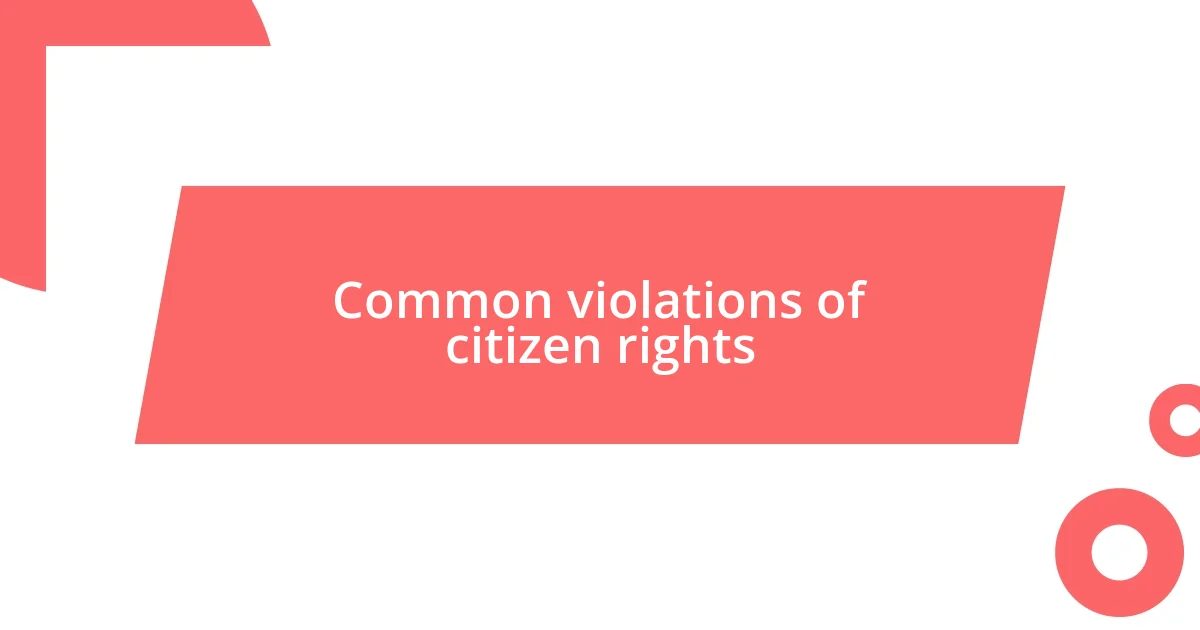
Common violations of citizen rights
One of the most heartbreaking common violations of citizen rights is unlawful detention. I remember reading a powerful story about a young activist who was arrested without proper charges, simply for speaking out against government policies. This incident struck a chord with me, making me wonder how many people suffer similar fates in silence. Think about it—when someone’s freedom is stripped away without due process, it sends a shiver down my spine, reminding us all of how fragile our rights can be.
Discrimination also lurks in the shadows as a frequent violation of citizen rights, impacting many individuals based on race, gender, or orientation. I think of a close friend who faced discrimination while applying for jobs, despite being highly qualified. It was disheartening to witness their struggle, and it made me question: why do biases still hold such power in our society? This experience highlighted how deeply ingrained prejudices can deny people their fundamental rights to fairness and equality.
Finally, the infringement of freedom of speech is another glaring issue. There was a time when I wrote a blog post on a sensitive topic, and I received threats aimed at silencing my voice. This situation made me reflect on the importance of safeguarding our right to express ourselves. Are we prepared to stand up when our voices—or those of others—are under attack? It’s in these moments that we find the true value of our rights and the necessity of raising awareness about their protection.
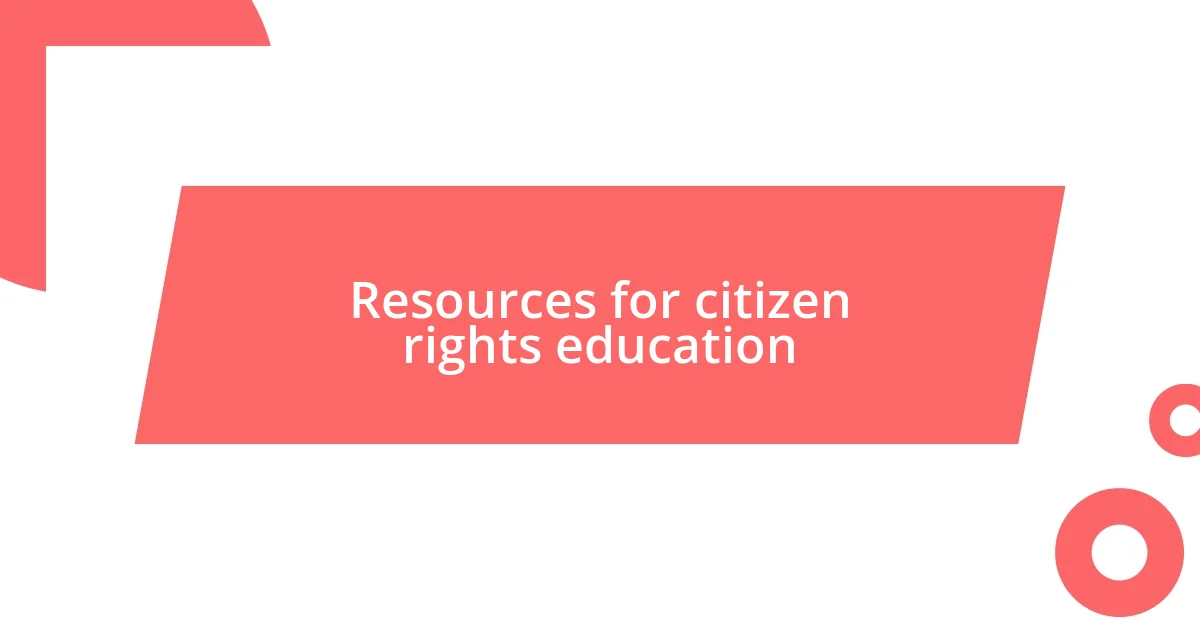
Resources for citizen rights education
Understanding citizen rights is crucial, and having the right resources can significantly enhance that knowledge. I often recommend community workshops or webinars, where experts break down complex laws into digestible pieces, making them accessible to everyone. Have you ever attended a workshop that opened your eyes to rights you didn’t know existed? I vividly recall one where a lawyer shared real-life cases that illustrated the importance of being informed—those stories lingered with me long after the session ended.
Another excellent resource is online platforms dedicated to human rights education. Websites like Amnesty International and the American Civil Liberties Union (ACLU) offer a treasure trove of articles, toolkits, and advocacy guides. I still remember downloading a toolkit from the ACLU that helped me understand my rights during interactions with law enforcement. It’s empowering to have that kind of information at your fingertips, isn’t it? Knowing how to advocate for oneself is a critical aspect of citizenship.
Lastly, local libraries often provide access to books and materials on civil rights, making them invaluable community resources. I once stumbled upon a book in my local library that chronicled the struggles and victories of rights activists throughout history. It was not just informative; it was deeply inspiring. The stories of resilience made me think about the impact we can each have—if we educate ourselves and take action, how might we contribute to positive change in our communities?










